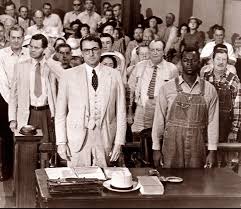The ironic, enduring legacy of banning ‘To Kill a Mockingbird’ for racist language
.jpg)
A movie adaptation of “To Kill a Mockingbird” — an American classic, occasionally banned. (Universal Pictures)
The public school district in Biloxi, Miss., did not specify which words, exactly, in “To Kill a Mockingbird” are so objectionable that the book was yanked from an eighth-grade reading list last week, 57 years after it published.
“There is some language in the book that makes people uncomfortable,” school board vice president Kenny Holloway vaguely told the Sun Herald.
Some language. Maybe it’s the same language that concerned a Waukegan, Ill., school system in 1984; or a middle school principal in North Carolina in 2004; or Virginia’s tiny Accomack County School District when it cleansed its libraries of “Mockingbird” last year.
That is: the n-word, which this newspaper also censors — and which Harper Lee pointedly did not when she wrote her Pulitzer Prize-winning novel about racism in the United States.
“We can teach the same lesson with other books,” Holloway explained to the Herald last week.
Similarly, we could illustrate the history of U.S. censorship with countless books other than “Mockingbird.”
Resteem, Upvote and Follow for More
nice post man